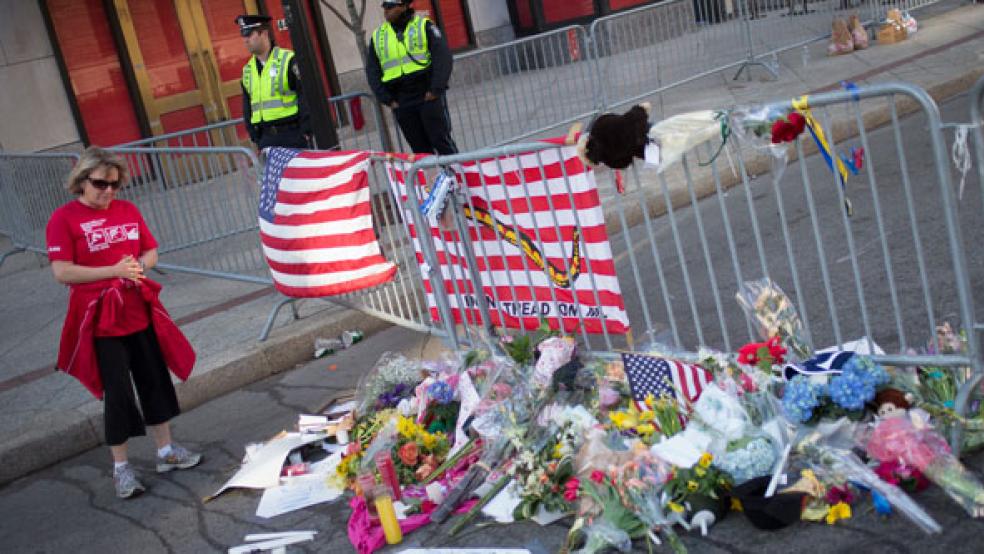In a country that routinely criticizes itself for its lack of exercise, the American media tend to excel at two things – jumping to conclusions and running off at the mouth. In the immediate aftermath of tragedy or crisis, a vacuum of information opens, and cable-news anchors and analysts feel compelled to fill it with uninformed speculation that gets repeated as fact. Pundits and politicians climb onto well-groomed hobby horses, promoting their causes by exploiting the crisis and fear of the unknown. We have seen plenty of that in past crises, and this week’s bombings at the Boston Marathon were no exception.

In some cases, the speculation arises just from the human impulse to impose order on the incomprehensible, combined with the pressure to say anything that comes with being a broadcast host. Wolf Blitzer’s much-criticized suggestion that the IRS tax deadline or Patriot Day in Massachusetts had a connection to the motive seemed less of a malicious claim than an attempt to fill three hours while having almost no reliable information on the attack. The same can be said for thousands of people on Twitter speculating on the nature of the attacker or attackers without anyone having the first clue as to who attacked us or why.
Of course, some people didn’t need a clue – and perhaps didn’t want one, either. Salon’s David Sirota just wished for the perpetrator to be“a white American,” in order to prove Sirota’s own theories on “white privilege.” In an article that has to be read to be believed, Sirota’s main concern wasn’t the prevention of another attack or delivering justice to the real bomber, but in preventing slander against, er, non-“white dudes.”
“[W]hite privilege will work to not only insulate whites from collective blame,” Sirota argues, “but also to insulate the political debate from any fallout from the attack. It will probably be much different if the bomber ends up being a Muslim and/or a foreigner from the developing world. As we know from our own history, when those kinds of individuals break laws in such a high-profile way, America often cites them as both proof that entire demographic groups must be targeted, and that therefore a more systemic response is warranted.”
And that might mean that conservatives will oppose comprehensive immigration reform and want to continue fighting the war in Afghanistan, Sirota warns, apparently unaware that many conservatives have defended those positions without needing a bombing in Boston. Sirota seems hilariously unaware that he’s actually doing exactly what he projects conservatives will do by exploiting the bombing for his own political posturing.
Still, Sirota’s piece is more of an embarrassment to Salon than it is a problem for anyone else. That’s not the case with former Rep. Barney Frank and current Rep. Steny Hoyer, who holds the number-two leadership post in the House Democratic caucus. Both men couldn’t wait to find out what actually happened before complaining that budget austerity had made the nation less secure.
“I never was as a member of Congress one of the cheerleaders for less government, lower taxes,” Frank told CNN the morning after the bombing. “No tax cut would have helped us deal with this or will help us recover.”
Hoyer went one step farther during his weekly briefing with reporters the same day. Talking Points Memo reported:
"Asked by a reporter whether Monday’s attack makes the argument for addressing sequestration, Hoyer explained, “I think there are multiple reasons for ensuring that we invest in our security — both domestic and international security. That we invest in the education of our children. That we invest in growing jobs in America. And don’t pursue an irrational, across-the-board policy of cutting the highest priorities and the lowest priorities essentially the same percentage…. I think this is another proof of that — if proof is needed, which I don’t think frankly it is.”
Put aside, for the moment, the fact that at this point neither man knew who had conducted the bombing or for what purpose. Has sequestration crippled the Department of Homeland Security’s budget to the extent that it left us open to attack? In FY2007, the DHS budget was $42.7 billion.
By FY2012, it had grown to $59.7 billion, with the FY2014 budget request reaching $59.9 billion. DHS funding has increased 40 percent since Democrats took control of Congress after the 2006 midterms, and it has actually gone up by $3 billion since FY2011, when Republicans took back the House – and it didn’t result in any attacks such as those seen on Monday.
Homeland Secretary Janet Napolitano warned in February that the sequester could force reductions as high as 5 percent for DHS, which would have brought the DHS budget to the FY2011 level. President Obama’s budget proposal this month made that “cut” moot, as well as the argument from Hoyer and Frank.
We can certainly debate whether DHS has enough cash to fulfill its mandate. What cannot be argued is that DHS has suffered through any budget cuts. In fact, the week before the bombings took place, DHS posted an RFP for new equipment– bagpipes and drum supplies. The RFP got pulled after critics lambasted Napolitano and DHS for buying musical instruments while singing the blues over its supposedly devastating budget cuts.
We may not have high expectations for the David Sirotas in our public debate, but we should have higher standards for elected officials in charge of the public purse. Before exploiting tragedies and crises to demand more cash from American taxpayers, they should at the very least wait for the facts to determine the proximate causes and the potential for pre-empting them.
Jumping to conclusions and running off at the mouth in the immediate aftermath of a crisis is bad for both credibility and public policy.






